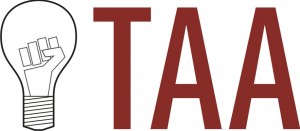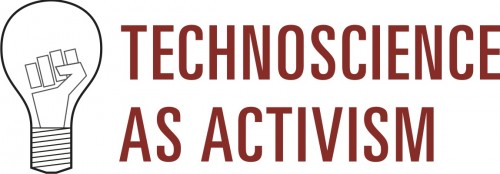From June 27-29 I will be hosting (throwing?) the Technoscience as Activism Conference in Troy, NY. We are currently accepting abstracts for conference presentations and workshop proposals through March 15th. The conference is sponsored, in part, through Rensselaer Polytechnic Institute’s 3Helix Program funded through the National Science Foundation’s GK-12 fellowship. The conference will focus on community-situated design and look for new approaches that interweave social justice and science/technology. Participants are also encouraged to submit full papers for potential inclusion in a special theme issue of the open-access journal PscyhNology. Conference participants will be expected to participate in both moderated panel sessions on the PRI campus as well as hands-on workshops held throughout the Troy community. There are two goals of this conference: 1) To facilitate the free exchange of ideas across multiple boundaries on the topic of technoscience as activism and; 2) offer an experimental alternative to the traditional role/format of academic conferences. This new experimental format includes active collaboration with the geographically-defined community that hosts the conference.
Back in October, after attending the annual meeting for the Society for Social Studies of Science (4S), I posted a critique of the traditional conference format. I was frustrated with the apparent hypocrisy of expensive, closed-door conferences full of people that want to democratize science. Industry-backed pundits and authors have been much more successful in shaping society’s relationship to science and technology. Where are academics? Where are all of the public intellectuals? While I acknowledge that specialists need a place to exchange ideas amongst themselves, there are ways of making academic conferences more transparent and the products of collaboration more accessible. Panels can be recorded and posted on the web, and proceedings can be made available for free or by donation online. It might not hurt to host the conferences in less expensive venues as well. But smaller, more focused conferences like TAA need to go even further. Holding them on campus can reduce the costs, but organizers should consider the possibility of collaboration with community groups. Is a community garden building a new cistern? Are there free schools interested in search of new pedagogical tools? These are the sorts of community relationships that not only help community groups, but also improve the work of academics.
It is essential to work with and not for community institutions and organizations. No one wants a flock of academics to descend from their ivory tower onto a 30-year-old community institution and tell everyone what to do. A reflexive approach to privilege and authority within the academy is necessary for effective and generative collaborations between academics and community organizations. Scientists do not have all the answers, but they frequently hold most of the power. A generative collaboration between professionals and communities requires strong ties and mutually understood commitments to the projects at hand. Civic science means more than “add community involvement and stir.” Such superficial approaches can actually lead to worse outcomes and less accountability [Pertinent information comes at 7:44 in the video.].
This is no simple task. Overreaches in authority by scientists are, unfortunately, almost inevitable. But there are good examples of how to do it right. A couple of examples include the Public Laboratory for Open Technology and Science (PLOTS) and the work to restore New Orleans communities destroyed by Hurricane Katrina, as documented by Barbara Allen and Isabelle Maret [PDF]. In both cases, the role of academic scientists are problemitized and subsequently redefined as (among other roles) support personel for citizens-led work. The mission statement for PLOTS says it this way:
Our goal is to increase the ability of underserved communities to identify, redress, remediate, and create awareness and accountability around environmental concerns. PLOTS achieves this by providing online and offline training, education and support, and by focusing on locally-relevant outcomes that emphasize human capacity and understanding.
The Technoscience as Activism Conference is deeply rooted in the sociological/pedagogical/conceptual array of DIY and hacker culture. The conference serves as a medium for the exchange of ideas, but the medium itself is also up for review, criticism, appropriation, and alteration. As the conference gets closer, and more people begin to propose workshops and presentations, the medium will become more tangible. This is where you come in. I hope academics and nonacademics alike are inspired to make this conference useful to them.
The call for papers and the submission forms can be found on the 3Helix Program website, but are reproduced here:
 This conference seeks new approaches to interweaving social justice and science/technology. Some that are already known include DIY and “maker” communities, Open Source Science, “Technologies for Non-violent Social Change,” and other new hybrid forms of collaboration that put technoscience in the hands of non-experts, local communities, indigenous groups and the less powerful. Typical approaches to “ethics in science” treat ethics as a police officer that operates at the borders, slapping science on the wrist when it over-steps. How can we treat ethics instead as a pro-active force, integrated from the start? Social scientists studying scientific controversy may know very little about the particulars of the science, and the scientist embroiled within the controversy may not know very much about the dynamics of communities or the relations of power between experts and the public. This conference will highlight ways to provoke engineers, social scientists, and the educators of future thinkers into considering new and innovative methods of merging social and technical dimensions of science and engineering research, teaching and practice. It will contribute to the possibilities for a “two way bridge” across the lay/expert divide; one in which social justice is informed by technoscience and not just technoscience informed by social justice. To this end, we are looking for papers and proposed panels that can discuss transformative possibilities for every level of making science, scientists, technology, engineers, and knowledge. Existing categories in which pertinent (and important) discussions are taking place are, but is not limited to, K-12 STEM education, advanced pedagogy in the natural/physical/life sciences, ethics, public engagement/understanding of science, theoretical and social studies on information and communication technology, political sociology of science, Science and Technology Studies, appropriating technology, feminist studies, emerging nanotechnology, postcolonial studies, engineering education, urban studies, and experimental art.
This conference seeks new approaches to interweaving social justice and science/technology. Some that are already known include DIY and “maker” communities, Open Source Science, “Technologies for Non-violent Social Change,” and other new hybrid forms of collaboration that put technoscience in the hands of non-experts, local communities, indigenous groups and the less powerful. Typical approaches to “ethics in science” treat ethics as a police officer that operates at the borders, slapping science on the wrist when it over-steps. How can we treat ethics instead as a pro-active force, integrated from the start? Social scientists studying scientific controversy may know very little about the particulars of the science, and the scientist embroiled within the controversy may not know very much about the dynamics of communities or the relations of power between experts and the public. This conference will highlight ways to provoke engineers, social scientists, and the educators of future thinkers into considering new and innovative methods of merging social and technical dimensions of science and engineering research, teaching and practice. It will contribute to the possibilities for a “two way bridge” across the lay/expert divide; one in which social justice is informed by technoscience and not just technoscience informed by social justice. To this end, we are looking for papers and proposed panels that can discuss transformative possibilities for every level of making science, scientists, technology, engineers, and knowledge. Existing categories in which pertinent (and important) discussions are taking place are, but is not limited to, K-12 STEM education, advanced pedagogy in the natural/physical/life sciences, ethics, public engagement/understanding of science, theoretical and social studies on information and communication technology, political sociology of science, Science and Technology Studies, appropriating technology, feminist studies, emerging nanotechnology, postcolonial studies, engineering education, urban studies, and experimental art.
Individual presentations can be submitted here
Workshop presentations can be submitted here
See you in June!
Follow me on Twitter! @da_banks


Comments 1
Overcoming Tote Bag Praxis » Cyborgology — April 18, 2012
[...] do at weekend-long establishment conferences. I have said a lot about conferences (here, here, and here) as have fellow cyborgologists (Sarah, Nathan, and PJ). All of these posts have a common thread: [...]